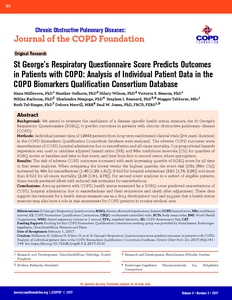Müllerova, H;
Gelhorn, H;
Wilson, H;
Benson, VS;
Karlsson, N;
Menjoge, S;
Rennard, SI;
Tabberer, M;
Tal-Singer, R;
Merrill, D;
et al.
Müllerova, H; Gelhorn, H; Wilson, H; Benson, VS; Karlsson, N; Menjoge, S; Rennard, SI; Tabberer, M; Tal-Singer, R; Merrill, D; Jones, PW
(2017)
St George's Respiratory Questionnaire Score Predicts Outcomes in Patients with COPD: Analysis of Individual Patient Data in the COPD Biomarkers Qualification Consortium Database.
Chronic Obstr Pulm Dis, 4 (2).
pp. 141-149.
ISSN 2372-952X
https://doi.org/10.15326/jcopdf.4.2.2017.0131
SGUL Authors: Jones, Paul Wyatt
![[img]](https://openaccess.sgul.ac.uk/109133/1.hassmallThumbnailVersion/JCOPDF-2017-0131-Mullerova.pdf)  Preview |
|
PDF
Published Version
Available under License ["licenses_description_publisher" not defined].
Download (2MB)
| Preview
|
Abstract
Background: We aimed to estimate the usefulness of a disease specific health status measure, the St George's Respiratory Questionnaire (SGRQ), to predict outcomes in patients with chronic obstructive pulmonary disease (COPD). Methods: Individual patient-data of 12043 patients from long-term randomized clinical trials (2-4 years' duration) in the COPD Biomarkers Qualification Consortium database were analyzed. The adverse COPD outcomes were: exacerbations of COPD, hospital admissions due to exacerbation and all-cause mortality. Cox proportional hazards regression was used to calculate adjusted hazard ratios (HR) and 95% confidence intervals (CIs) for quartiles of SGRQ scores at baseline and time to first event, and time from first to second event, where appropriate. Results: The risk of adverse COPD outcomes increased with each increasing quartile of SGRQ score for all time to first event analyses. When comparing the lowest versus the highest quartile, the event risk (HRs [95% CIs]) increased by 40% for exacerbations (1.40 [1.29, 1.51]); 2-fold for hospital admissions (2.01 [1.78, 2.28]) and more than 2-fold for all-cause mortality (2.30 [1.91, 2.78]). For second event analyses in a subset of eligible patients, these trends persisted albeit with reduced risk estimates for exacerbations. Conclusions: Among patients with COPD, health status measured by a SGRQ score predicted exacerbations of COPD, hospital admissions due to exacerbations and their recurrence and death after adjustment. These data support the rationale for a health status measure use as a drug development tool and suggest that a health status measure may also have a role in risk assessment for COPD patients in routine medical care.
Statistics
Item downloaded times since 14 Sep 2017.
Actions (login required)
 |
Edit Item |



